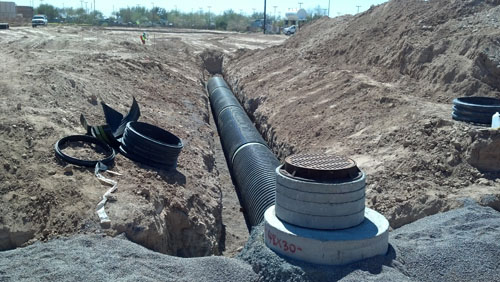Private sewer
A pipe carrying sewage (waste water and excrement) that serves only one property is referred to as a drain. Drains are privately owned and maintained as far as the boundary of the property. Beyond the boundary of the property a drain is referred to as a public lateral drain.
A pipe that serves more than one property is referred to as a sewer. Sewers that connect to the public sewer network are referred to as public sewers.
Under the Public Health Act 1936 all sewers (as defined by the Public Health Act 1875) which were in existence on 1 October 1937 became public sewers. After 1937 new sewers were only public if they were laid or adopted by the sewerage undertaker.
However, on 1 October 2011 in England and Wales, private sewers and lateral drains that were connected to the public sewer before 1 July 2011 were transferred to the ownership of the regulated sewerage companies (generally water companies).
This means that property owners only remain responsible for drains that serve only their own property, up to the point they connect to another drain or sewer, or as far as the boundary of their property. In the case of blocks of flats, the property owner(s) are responsible for the drain as far as the boundary of the property.
Properties not connected to the public sewer network, for example if they have a septic tank or cesspit, are not affected by this change, and their sewers or drains remain private. In addition, large commercial sites with multiple occupants may have private sewers or drains, as may sites in which sewers or drains discharge to a watercourse. Sewers owned by Railway Authorities also remain private.
New or existing sewers or lateral drains can be adopted by a sewerage company under Section 102 of the Water Industry Act 1991 (existing sewers) or section 104 of the Water Industry Act 1991 (new sewers). The sewerage company will then maintain them at their own expense.
Successful ‘adoption’ of sewers requires that they are constructed to required standards. If they are not, it may then be necessary to carry out remedial works to bring them up to an adoptable standard.
For more information see:
[edit] Related articles on Designing Buildings Wiki
- Cesspool.
- Difference between drains and sewers.
- Drainage.
- Drains.
- Grease management.
- Lateral drain.
- Manhole.
- Manhole cover.
- Public Health Act 1875.
- Public sewer.
- Safe working in drains and sewers.
- Sanitary pipework.
- Section 102 existing sewer adoption.
- Section 104 new sewer adoption.
- Septic tank.
- Sewer construction.
- Sewerage.
- Sewerage company.
- Sustainable urban drainage systems SUDS.
- Thames Tideway Tunnel.
- Waste water.
Featured articles and news
British Architectural Sculpture 1851-1951
A rich heritage of decorative and figurative sculpture. Book review.
A programme to tackle the lack of diversity.
Independent Building Control review panel
Five members of the newly established, Grenfell Tower Inquiry recommended, panel appointed.
ECA progress on Welsh Recharging Electrical Skills Charter
Working hard to make progress on the ‘asks’ of the Recharging Electrical Skills Charter at the Senedd in Wales.
A brief history from 1890s to 2020s.
CIOB and CORBON combine forces
To elevate professional standards in Nigeria’s construction industry.
Amendment to the GB Energy Bill welcomed by ECA
Move prevents nationally-owned energy company from investing in solar panels produced by modern slavery.
Gregor Harvie argues that AI is state-sanctioned theft of IP.
Heat pumps, vehicle chargers and heating appliances must be sold with smart functionality.
Experimental AI housing target help for councils
Experimental AI could help councils meet housing targets by digitising records.
New-style degrees set for reformed ARB accreditation
Following the ARB Tomorrow's Architects competency outcomes for Architects.
BSRIA Occupant Wellbeing survey BOW
Occupant satisfaction and wellbeing tool inc. physical environment, indoor facilities, functionality and accessibility.
Preserving, waterproofing and decorating buildings.




















